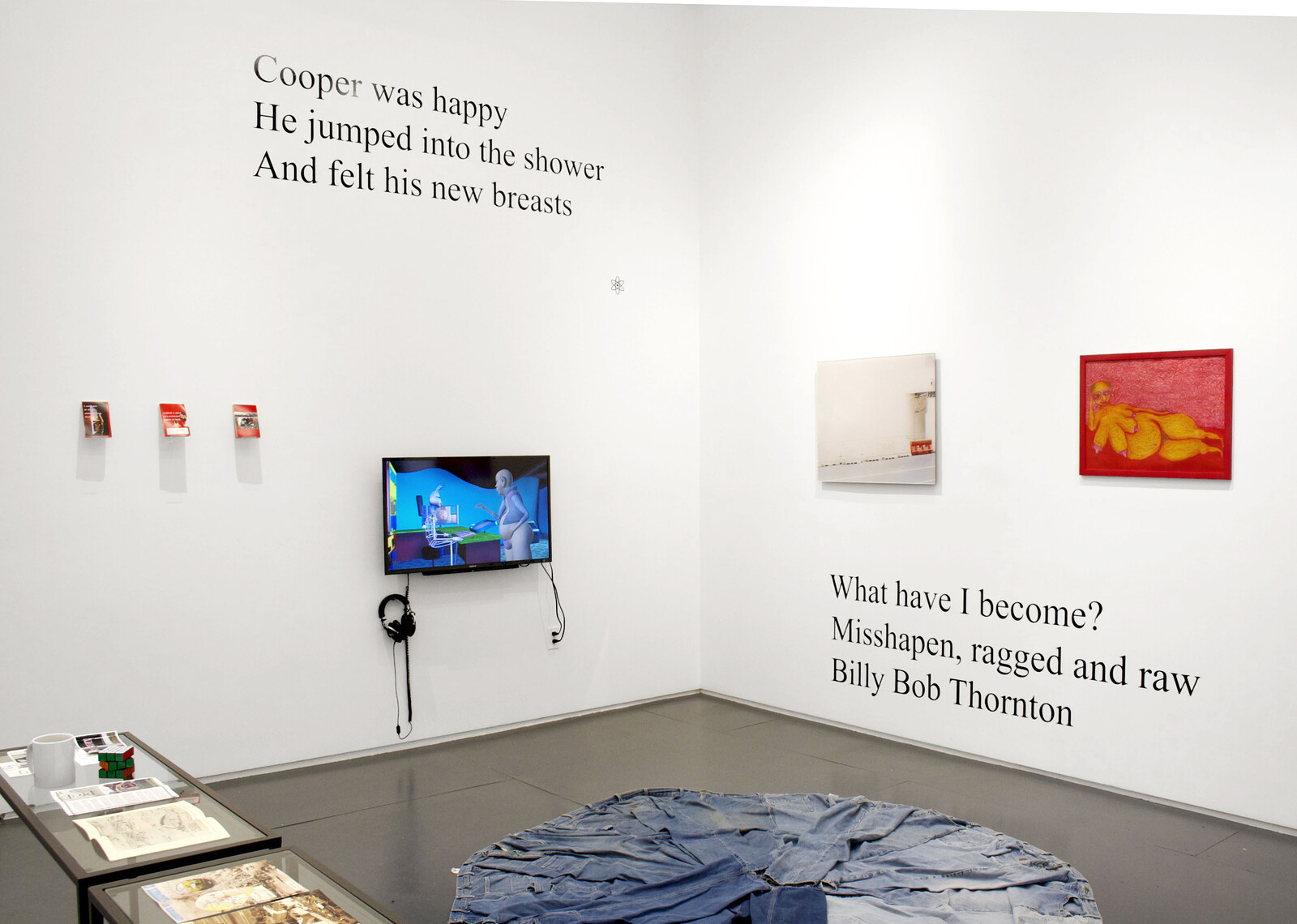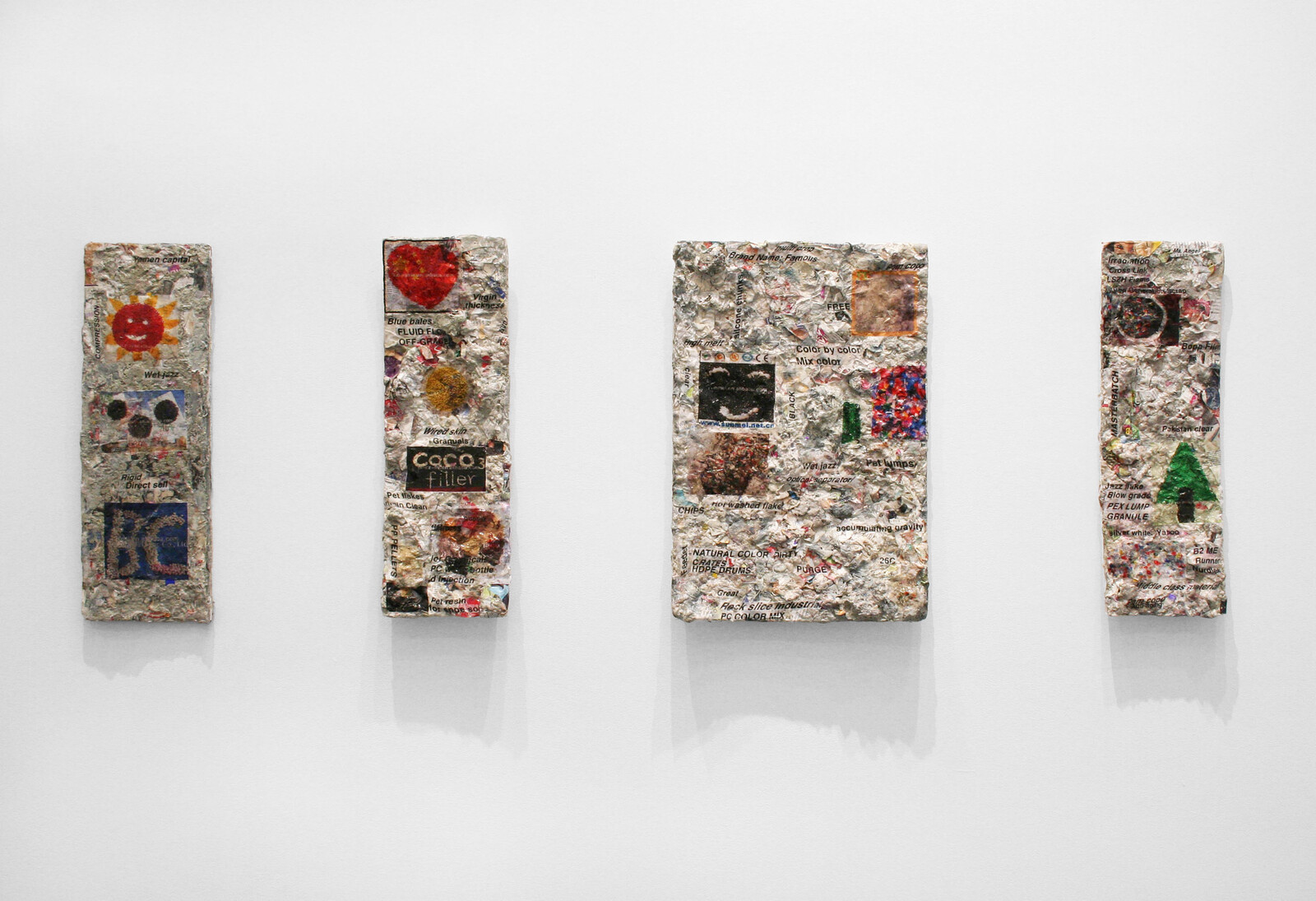Stupidity is a tricky thing. It’s omnipresent, but usually hidden. It can be the place where things begin—first drafts, new ideas—but it’s also a final judgment. As philosopher Avital Ronell points out, stupidity has its own nature and contours, yet we rarely take time to explore it. We tell children that it’s wrong to call someone stupid, because we consider it “the ur-curse, the renunciation of which primes socialization in this culture.”1 Fear of being stupid can inhibit desire, but the inhibition feels necessary. Certainly, it’s as derogatory a term in art criticism as it was in kindergarten.
But it might be time to reconsider. Deliberately or not, “Thanks to Apple, Amazon, and the Mall” presents some very stupid things—many of them specific to online life and its vernacular—as a crucial means for contemporary socialization. The group show, curated by Brian Droitcour, takes social relations in the digital age as its focus: the emotional valences of digital identities, the implications of their potential for shape-shifting, and the way artists weave their lines of inquiry between the porousness of the virtual world and hard materiality.
“Thanks to Apple” is a small show, with nine artists and one gallery of works, but it’s also part of a larger project. In 2013, Droitcour was invited by the gallery to propose a digital program. The result was Klaus_eBooks, a series of digital artist books of which seven have been published so far, and “Thanks to Apple,” an exhibition produced “in tandem.” Characters, symbols, and lines from the books reappear in the physical space of the gallery; some are directly excerpted, others only tangentially related. The flamboyant little ball of fur and purple feathers that the viewer sees pinned high on a wall upon entering the gallery (Toy, 2014) by Isaac Richard Pool seems to have little connection to Alien She, Pool’s 2013 book of poems, part of Klaus_eBooks series. The three lines reproduced as a large wall text next to it (“Deserted beaches/This thong no longer fits me/I’ve grown a large dick”) are from TG-30, another ebook of the series, this time by Body by Body, the artist duo Melissa Sachs and Cameron Soren.
TG-30 is neither that well written nor particularly inventive in its use of the digital book medium. The stories, which are only a few paragraphs long, are heavy on “bountiful breasts” and “slithering cocks,” and are illustrated with crudely racy Photoshoppings of everything, from celebrities, adverstisements, children’s drawings, and softcore porn. They are funny in a hormone-addled teenage way (and were in fact modelled on teen fan fiction message boards and fetish websites). Like much of the work in “Thanks to Apple,” TG-30 uses appropriation to capture adolescent desire as a motivating force of online communities and subcultures, and the wall texts in the gallery seem chosen for their fragmented inchoateness.
The most formally coherent of the digital book series is Ann Hirsch’s app Twelve, her work for Klaus_eBooks. Against the backdrop of an AOL chatroom circa 1998, the reader follows twelve-year old Anni—the story is autobiographical—as she negotiates her newbie status, makes friends and frenemies, and is singled out by an older user seeking cybersex. Anni is as substantial a persona as any character in a novel, her voice faithfully conveying a pre-teen’s slang-ridden speech and its particular mixture of social anxiety and cockiness. Despite its relatively benign contents, the book was censored by Apple for being “explicit” and is no longer available for purchase on iTunes, but can be viewed by request at the gallery and purchased as a “special edition” jailbroken iPad. Hirsch’s drawings in the gallery seem to reach further back into childhood: brightly colored pastel renderings of girls with popping eyeballs (Truly Exotic, 2014) and multi-breasted octogenerians (Reclining Slutty Grandpa, 2014) that are equal parts monstrous, childish, and uncomfortably sexual.
James Duesing’s End of Code (2009) weaves the fantastic and the juvenile into an intensely surreal animation, presented on a plasma screen hanging on one of the walls. I had to watch it several times just to disentangle its characters (say, the ham-hock who turns into a green-skinned armless blonde and then into George Washington in drag) and its plotline, in which hacker cells compete for control of all the traffic lights in the universe. The animation is a delirious remix of the empty language of corporate advertising and self-help slogans (“I will be light and fluffy/I will be value added/I will be crisp on the outside yet tender in the middle”), all the more absorbing for its ability to spin fantasy from vapid terminology.
Droitcour, himself a critic, has written forcefully about post-internet art, much of which, he argues, is more about looking good on Instagram than any structural engagement with technology’s effects and affects. With “Thanks to Apple” and Klaus_eBooks he offers an alternative take. The work he selects could hardly be accused of formal acrobatics, but it burrows deep into the cultures of the internet with a spirit of criticality, an oblique sense of humor, and yes, a high tolerance for stupidity. If the adolescent puns, childish desires, and the sheer disposability of these landscapes seem a tad shallow, it’s refreshing to find artists not afraid to get their hands dirty. Thanks to Apple and Amazon and all the rest, connectivity has hit new lows as well as new highs, and “Thanks to Apple” reveals the space it has opened for a new kind of poignancy and (stupid) poetry.
Avital Ronell, Stupidity (Urbana/Chicago: University of Illinois Press, 2002), 10.








